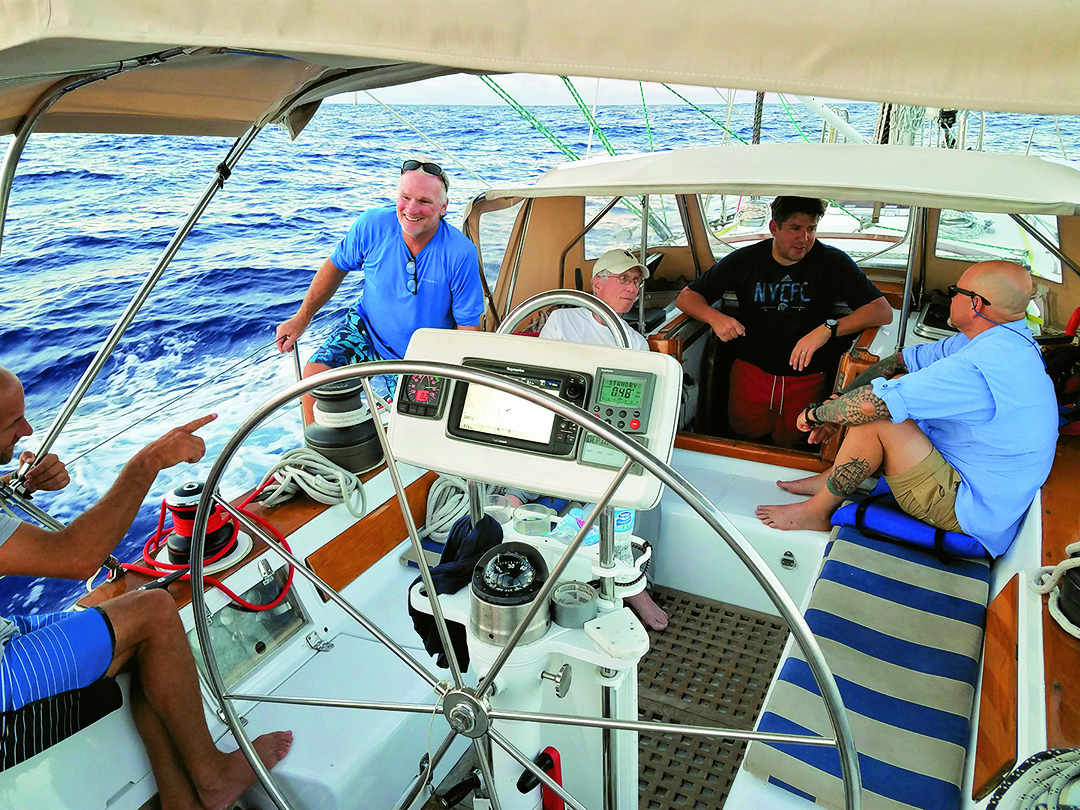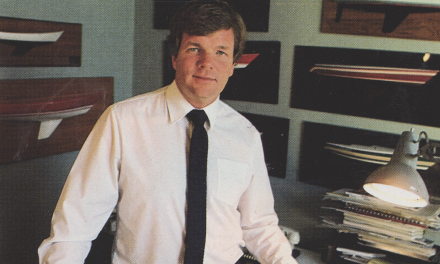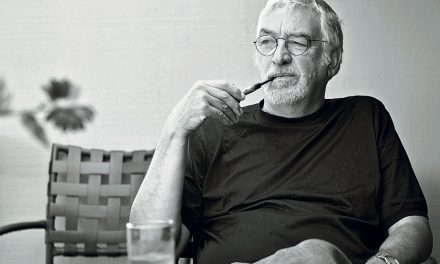Vivian Vuong is on a mission to make sailing more accessible to all.
Issue 142: Jan/Feb 2022
One of sailing’s great paradoxes is that while it offers an immense sense of freedom, in exchange you must accept the reality that you have little control over what the weather, the sea, and the boat may dish up. For some people, the self-reliance and mental fortitude this requires can be intimidating.
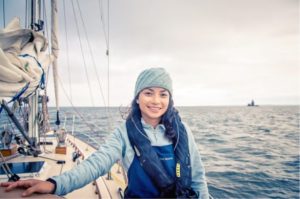
Vivian smiles after flaking the sails on a delivery from Newport to Annapolis. Photo courtesy Ocean Passages.
But for Vivian Vuong, these challenges are part and parcel of a life that has been forged finding strength in precisely those qualities of adaptability, independence, and working around and through forces greater than oneself to move forward. In that sense, she’s uniquely suited to thrive as a professional sailor, though in an industry that is largely white and male-dominated, the 33-year-old—at barely 5 feet tall and of Filipino and Vietnamese descent—doesn’t fit the mold. But Vivian is used to not fitting in, and her resilience has helped her carve out a career in an industry where she stands out.
“I want to show people that sailing isn’t just a man’s industry. I’d like to be someone who empowers minorities to sail,” she says. “I want to show everyone that you don’t have to be affluent and wealthy, you don’t have to be part of a fancy club, and you don’t have to own a pair of deck shoes to fit in. That there’s room for us all to work together with respect and understanding.”
“Vivian has every right to be proud of herself,” says John Kretschmer, the offshore sailing coach and author (“Big Sea, Small World” January/ February 2020), who has mentored Vivian and her husband, Nathan Zahrt, in their fledgling sail training business aboard their 47-foot Compass, Ultima. “She’s the epitome of a self-made woman who made her way into the male-dominated sailing world the hard way… but she’s self-effacing and humble, her self-assurance is natural and genuine, she’s always ready to lend a hand and a smile. She and Nathan both understand that to survive and thrive at sea you need respect for the ocean and for your shipmates. To be able to admit your mistakes and realize that the pathway to experience is fraught with pitfalls while still maintaining the ability to inspire is what allows you to be a great teacher.”
The path that led Vivian to this point has been tough from the beginning. Her father, who escaped the Vietnam War as a refugee, worked in the casino business, regularly uprooting his family to go wherever the work was. Vivian would often crisscross the country unaccompanied, relying on the kindness of strangers and airline staff to deliver her safely to whichever uncle, aunt, or grandparent was waiting at the other end.
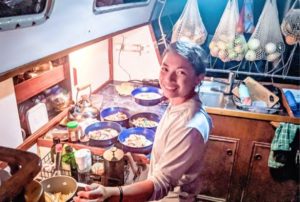
After managing and running a catering company on land, Vivian went on to a yacht cookery school to enhance her skills in the galley. Photo by Nathan Zahrt.
It was a lonely life for a child, and the constant moves made friendships and academic achievement a real challenge. But it also made her strong and self-reliant.
“My childhood wasn’t normal,” she says. “Not everyone’s is. But I give a lot of credit for my determination to being raised by people who expected me to survive on my own. My parents came to this country with close to nothing, worked for themselves with sheer guts and drive to earn a living. Sure, my parents and I didn’t get along a lot of the time while I was growing up, but looking back, I can see that they did the best they could. I thank them for giving me that independence and the confidence to set out to wander around this world on my own.”
That wandering embedded within her a desire for an adventurous life. She observed the professionalism of the many flight attendants who were “my temporary guardians of the sky” and thought about how one day maybe she could have a job that would let her travel the world as they did.
Eventually, that idea began to evolve into a life on the water when friends talked Vivian and Nathan into moving to Melbourne, Florida, to help them refit a 1973 Irwin 37. It sounded like a crazy, fun adventure, and the couple jumped at the opportunity. The plan was to fix it up, teach themselves to sail, and then go cruising in the Bahamas.
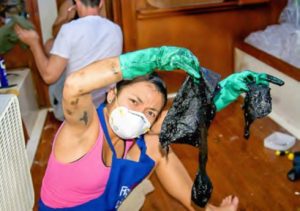
Finding oily rags while refitting Vivian and Nathan’s first boat, Hobo Chic. Photo by Meagan Wildwoods.
The friends had very little experience on boats. Living aboard full-time for over two years while simultaneously upgrading the boat made for a steep learning curve. They learned a ton, but the reality of sailing as two couples with four very different personalities eventually led Vivian and Nathan to head in a different direction.
They sold their share of the Irwin, and the pair took a job with a professional captain who was delivering a Hylas 54 from the British Virgin Islands to Newport via Bermuda.
“Our flights and food expenses were covered, and we got to explore foreign ports, even if it was only for a few days,” Vivian writes in a blog post on extremenomads. “It felt like a grand vacation with a mission and we enjoyed the freedom and adventure it offered.”
The trip convinced the pair that this was the life for them.
“We loved the idea of traveling while still working and focusing on self-sufficiency. Sailing was unlike anything we’d ever done in our lives, and it was (and still is) so intriguing,” she says. Their goal was to save enough money to buy their own boat, to be able to make their own destiny as sailors. Not surprisingly, they encountered various opinions on the concept, not all of them positive.
“I had multiple people tell me, ‘You’ll never make it in sailing,’ ’’ Vivian says. “But I was determined to push ahead, make a little money, and buy a boat that we would be able to fix up ourselves, mostly with our own skills and time.”
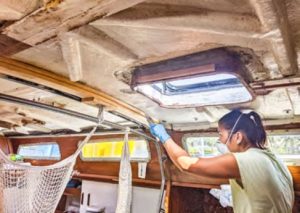
Vivian works to replace the interior headliners and paint the fiberglass on Ultima. Photo by Nathan Zahrt.
While Nathan worked to earn his licenses to become a delivery captain, Vivian worked to develop skills across all aspects of the professional yacht world. She started as a stewardess, became a deckhand, upgraded to a mate, and eventually flew to Palma de Mallorca to complete a yacht cooking course, letting her take work as a chef. She took courses to qualify her for all the basic requirements of working on luxury yachts including STCW, a five-day, safety-at-sea training focusing on firefighting, life raft deployment, swimming, and first aid.
A job as first mate on a 108-foot yacht sounds glam, but it was, Vivian says, “the most physically demanding job I’ve ever had. But I enjoyed the challenge. I wanted to learn. I wanted to know how to effectively sail, maintain, and repair everything on the boat. I wanted to make sure I know how to deal with any situation that arises at sea.”
Responsible for maintenance above and below deck, Vivian polished stainless fittings until her fingers bled.
“Motor yachts have to be clean, shiny, and sparkling, along with their tenders,” she laughs. “When I wasn’t cleaning, there were anchor windlasses to be refurbished, LED lights to be replaced, VHFs to be rewired, and new electronics to be installed. I stripped paint in the engine room and repainted it from end to end. I spent countless hours in bilges finding and fixing leaks, scrubbing, fixing broken mounts and pumps, and running hoses. Above deck there was endless polishing of brightwork, sanding, taping, and varnishing. And then, when guests or owners were aboard, I had to do all those things while wearing a clean white polo shirt—plus launching jet skis, paddleboards, fishing and diving gear, and all the other water toys.”
Between seasonal gigs on yachts, Vivian would join Nathan on deliveries to gain more sailing experience. Over five years, she sailed on more than a dozen deliveries— including a transatlantic on a Helia 44—and worked as crew on another dozen vessels, racking up over 30,000 nautical miles on boats and yachts from 37 to 150 feet.
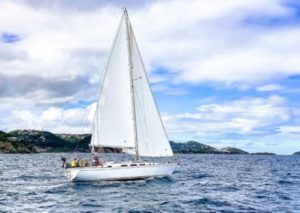
Ultima underway in the Virgin Islands. Photo by John Kretschmer.
Once Nathan earned his licenses, the team began double-handing boats between the Caribbean and the United States and up and down the East Coast. In 2019, they achieved their goal of owning their own boat when they bought a 1981 Angelo Lavranos-designed Compass 47, built in South Africa.
“We found her on the hard in Cambridge, Maryland,” Vivian says. “The engine was brand new, only eight hours on it. But everything else needed to be replaced or fixed. We took off old standing and running rigging and replaced it with new. She had no working electronics, so we rewired and installed a new depth gauge, wind instruments, VHF, autopilot, AIS, and solar.”
Over a year, they meticulously restored and upgraded Ultima in preparation for launching their sail training business, Ocean Passages. In this, they had found a powerful mentor along the way. Vivian had met John Kretschmer’s wife and sailing partner, Tadji, after replying to a comment on her Facebook page; both Nathan and Vivian were fans of John’s books.
“When Nathan returned from the United Kingdom after finishing up his Royal Yachting Association Yachtmaster Offshore training, they came to our Christmas party, and a fast friendship took root,” John says. “When we decided to expand our offshore sail training business, we knew that Nathan and Vivian were the perfect couple to work with. We were attracted by their sheer hard work and tireless dedication to upgrading every aspect of their sailing and seamanship skills. They’ve done the hard work of logging miles, deep ocean miles aboard a variety of different boats and have become highly accomplished sailors along the way.”
Helping the young couple develop their business and bringing them into his own successful enterprise, John has been a driving force, believing in Vivian and Nathan and guiding them at every step. “He was there with us from the start of Ocean Passages,” Vivian says, “even coming out to Cambridge before we had put an offer on Ultima to check her out while she was still on the hard. His support means the world to me, because the way he and Tadji live their life is very much in tune with how I live mine. To succeed on whatever track you choose, you have to surround yourself with those on the same mission as you.”
Aboard Ultima, Vivian is as confident and competent going up the mast as she is handling lines, getting her hands dirty in the engine, or creating a feast for the crew.
“Taking on a variety of professional roles on boats helps prepare you for being a multitasker, especially when there are captains and mentors willing to teach you,” she says.
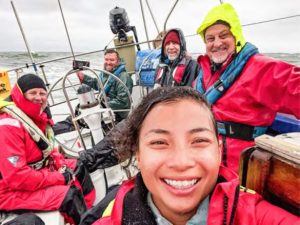
(L to R) Rob, Nathan, Lee, and Michael with Vivian on a training passage from Maryland to the U.S. Virgin Islands via Bermuda. Photo courtesy Ocean Passages.
John says one of the things that impresses him about Nathan and Vivian as sailing professionals is that they “complement each other perfectly and don’t fall into predictable gender roles. Vivian is an incredible chef, but Nathan often cooks underway. Vivian is usually at the helm when they come into a crowded marina. They have the right mix of communication and sailing skills to make a sailing life work.”
But overcoming stereotyped gender roles in the marine industry has not always been easy. Although Vivian has had many positive experiences with co-workers, clients, and employers, speaking out about the sexism she’s encountered is important in trying to effect change.
“If you’re a woman working in a male-dominated industry, unfortunately you are likely to encounter unprofessional behavior at some point. I hope that one day, it will be utterly shocking to hear that statement, but right now it is so common that it’s accepted,” she says. “I’ve had an owner of a yacht tell me that he wanted to pay for me to have implants so that I could look a certain way, and that I should start walking around in high heels. There have been nights when I’ve been too scared to sleep because I’m stuck on a boat with someone who objectifies me and has crossed professional boundaries. I have had to make completely unfair choices between keeping a job and my physical and mental health.”
Vivian wants other women to know that they are not alone, that they deserve respect, and that they can have a rewarding career at sea. “Even though the marine industry has bashed me unforgivingly, being at sea honestly makes me feel like the strongest, bravest, and most resilient person alive. I want to help other women feel that power too.”
Being Asian-American has also added a layer of complexity in her interactions in the industry, especially since the beginning of the pandemic. “I’ve had some nasty comments from people who find terms like Kung Flu and the Chinese Flu funny and have directed them towards me. I feel like shouting, ‘Hey! I live on a boat! I’m not out here trying to spread the virus!’ I was born here in the States, and it’s awful being treated like I don’t belong. We’re all humans with hearts.”
Vivian has always believed that treating people fairly and with kindness is a part of her job, as well as her life.
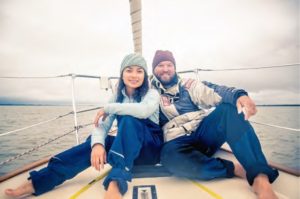
Vivian and Nathan have logged over 120,000 nautical miles between the two of them. Photo courtesy Ocean Passages.
“I have always been someone who encourages helping each other and having a high degree of professionalism aboard. No matter what position I am hired on as, I will do whatever it takes to get the boat to the next port safely and efficiently. That means if I am mate, I help with dishes, even if I still have to tidy or clean the tender. If I am chef, I’ll still help with handling lines or cleaning outside of the galley. If other crew don’t take their jobs seriously, I just focus on what I need to do to set a good example. People who don’t care about the boat or their responsibilities don’t last long in this industry.”
There were times, she says, when she wanted to give up. “But when you are motivated and have the drive to succeed in something you know you can do well, things start to fall into place. You have to be patient with yourself, knowing that even if it doesn’t feel like you’re going in the right direction, sticking to your morals and listening to your heart will lead you towards your goals.”
These days, Vivian continues to push herself to learn and expand her professional experience. She’s on track to earn her 100-ton master’s license, and while the pandemic put a pause on their business, she and Nathan headed into 2021 with a booked sailing schedule aboard Ultima. And, with a second business called VIZA, Vivian is throwing herself wholeheartedly into her skills as a photographer, videographer, and licensed drone pilot.
“When I was a kid, my heroes were David Attenborough and Connie Chung, and all I wanted was to be an explorer and reporter,” she says. “In many ways, being a sailor is much like being an explorer, so I feel like I’m pretty close to living out my childhood dream. And for that, I’m grateful.”
Erin Carey is the founder of Roam Generation, a travel and lifestyle PR agency focused on helping brands and experts raise their profile and increase their organic reach. Roam Generation is run from Erin’s 47-foot Moody as she and her family sail around the world. Follow their adventures on Facebook @SailingtoRoam or to inquire about PR, visit roamgeneration.com.
Thank you to Sailrite Enterprises, Inc., for providing free access to back issues of Good Old Boat through intellectual property rights. Sailrite.com


